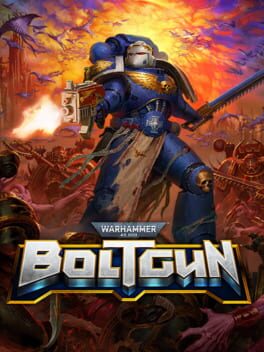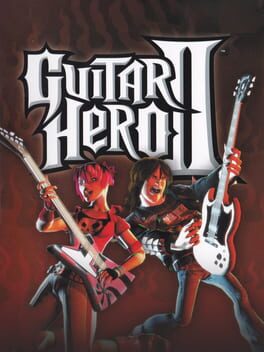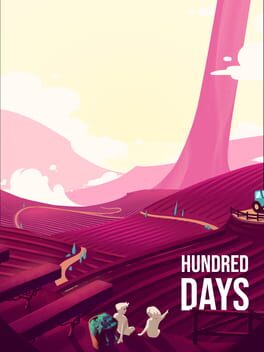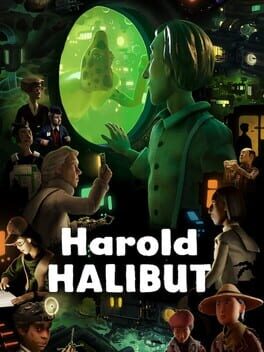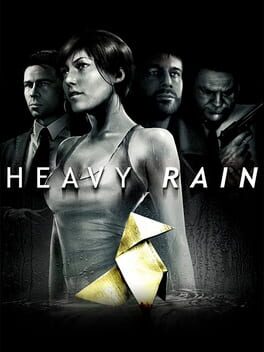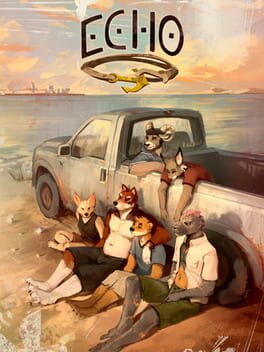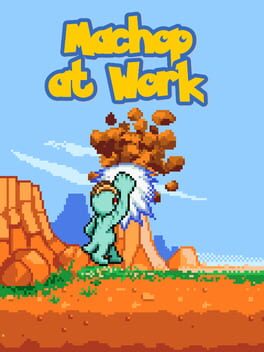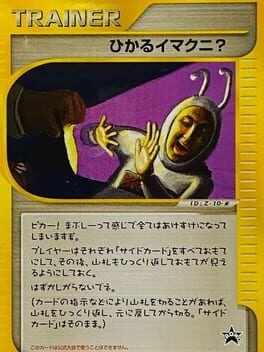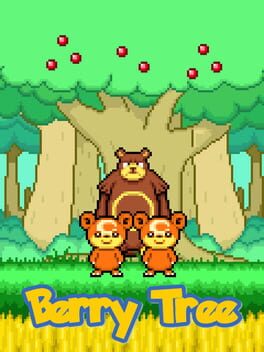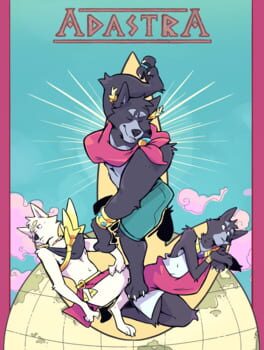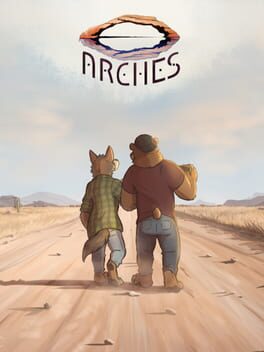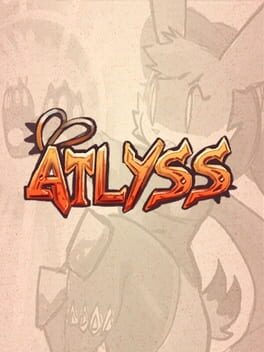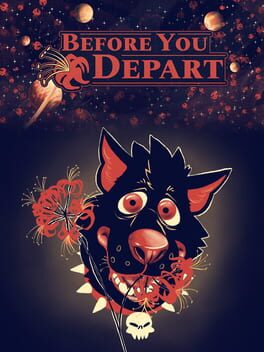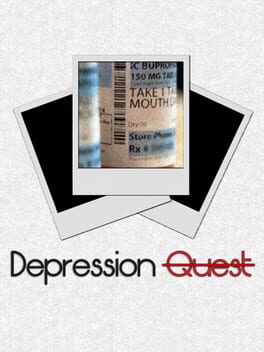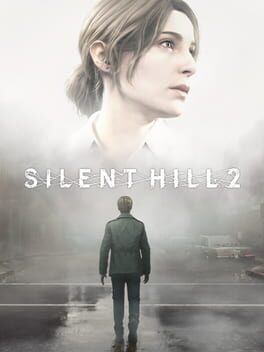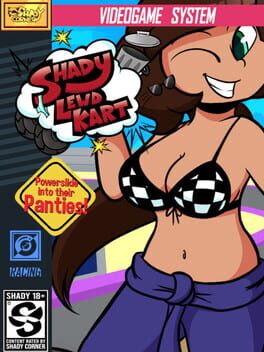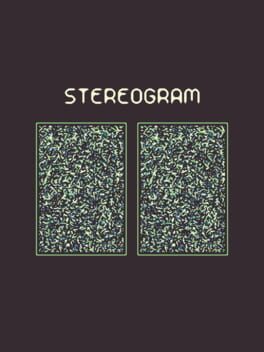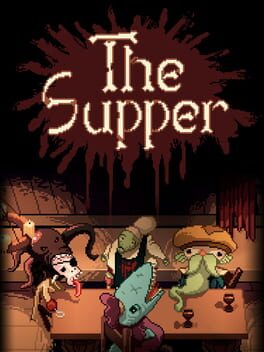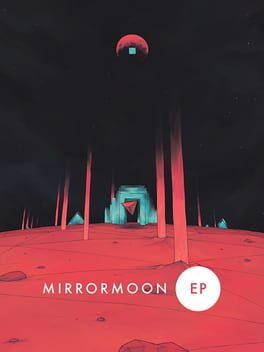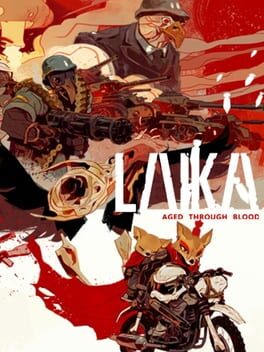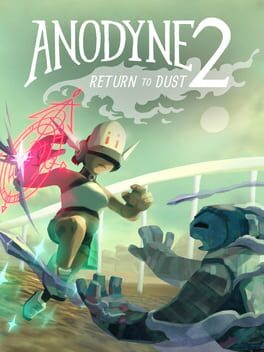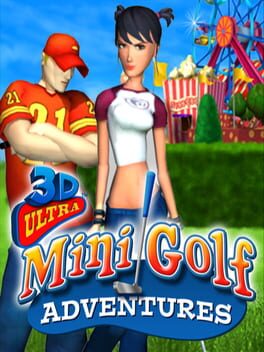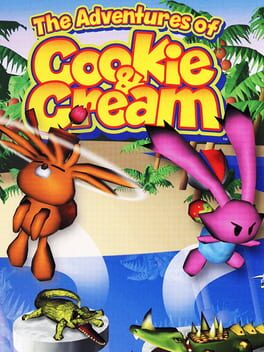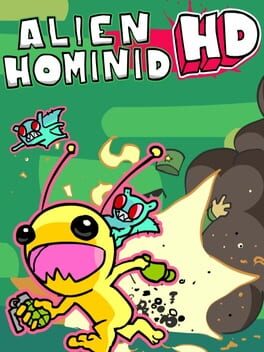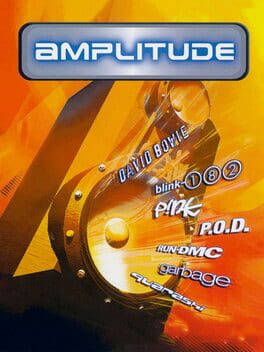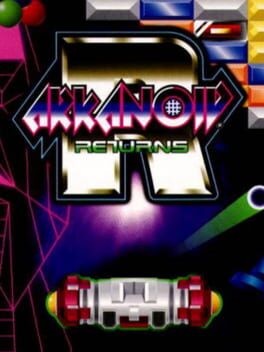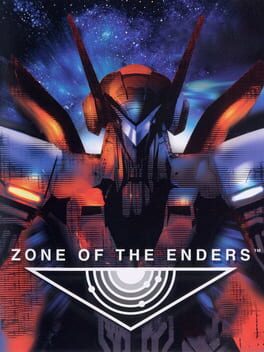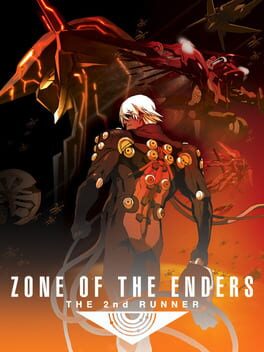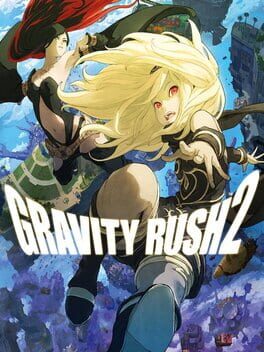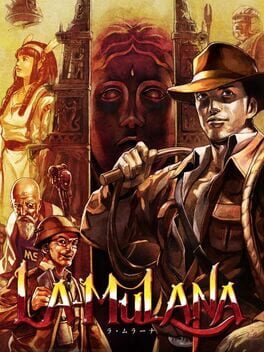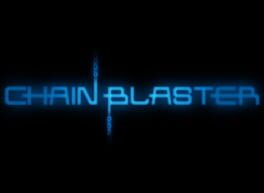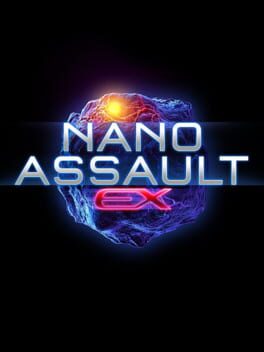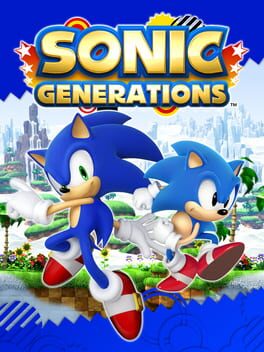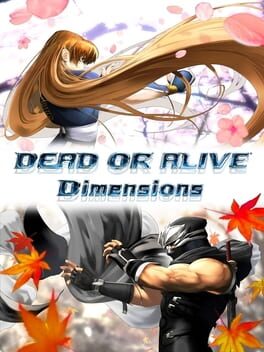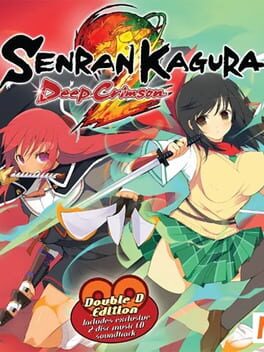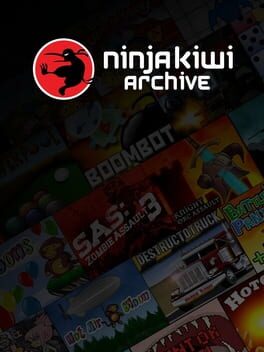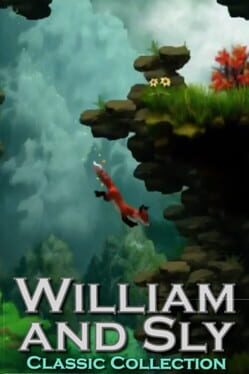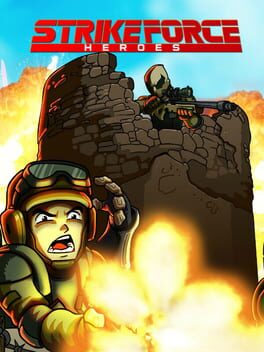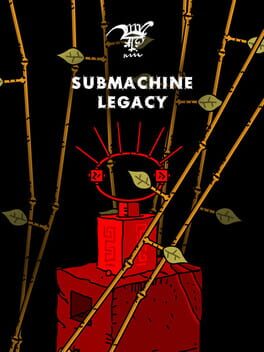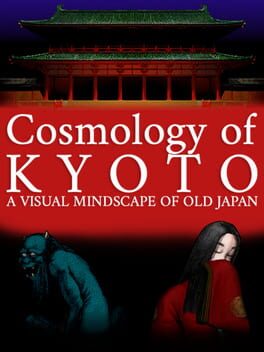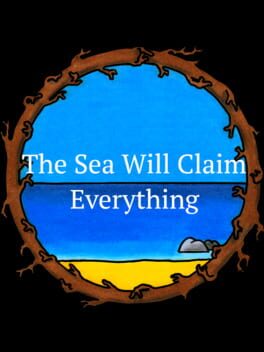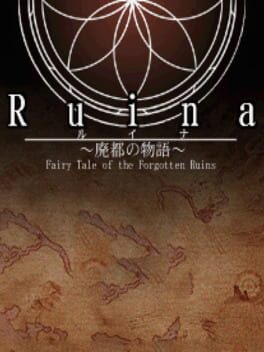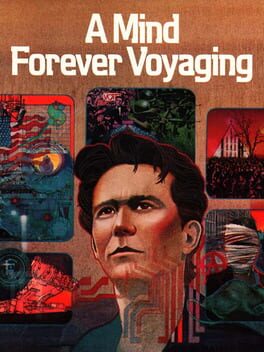Bojangles4th
BACKER
1519 reviews liked by Bojangles4th
Take “boomer shooter” out of your vocabulary; the term has been rendered meaningless.
I knew this entire little sub-genre of first-person shooters was cooked the second that the joint advertising teams of Games Workshop and Focus Entertainment all came to the conclusion that “boomer shooter” is a marketable enough selling point to tie your multi-million dollar IP to. If, indeed, it ever did mean something, it doesn’t anymore. What a boomer shooter is, in a post-Boltgun world, is “a shooter with pixel graphics”. That’s all. And if that’s all that it was — just a Doom Eternal demake — that would be forgivable. But the reality is that Boltgun is a completely miserable experience made by people who have zero fucking clue what they’re doing, chasing after trends without so much as an inkling of understanding as to why those trends are popular in the first place. Sure, fuck it. The new Doom games are gory shooters. Throwback games made popular by studios like New Blood seem to sell well. All we need to do is put the two together, boom! Free money! Paint it all in space marines and warp and chaos and we’ll be billionaires before breakfast tomorrow. How hard could it be?
I can’t fucking stand Boltgun. For some ungodly reason, someone in charge decided that the best people to put to work on a first-person shooter would be a crack team of board game and strategy developers from Auroch Digital, all of them completely unqualified to get to work on a project such as this. Consider this your first warning sign, long before you even boot up the game; why would Focus hire out to the studio behind Achtung! Cthulhu Tactics and Beermaster: Beer Brewing Simulator to make what’s intended to be a fast, brutal, tightly-paced shooter? Is it because they genuinely believed that these were the best people for the job, or was it because some tiny management-game studio from Bristol wasn’t asking for as much money as the next guys who knew what they were doing? I don’t blame Auroch, necessarily; I know what it’s like to be way in over my head under the guidance of a boss who doesn’t know enough to understand how badly I’m fucking up.
Boltgun is a game of numbers, and not of much else. “Suit your weapon’s strength to an enemy’s toughness rating,” reads one particularly cheery loading screen tip. As requested, I take aim at a Level 3 Nurgling with my STR 5 Boltgun, and the taste of bile in the back of my throat gets harder to ignore. Locking your reticle on an enemy will give you every detail about them you could ever want to know: their name, their level, total health, current health, social security number, bank password, browser history, the works. You swap between the weapons on your hotbar and each of them tells you the exact strength and name of the equipped gun: STR 4 Boltgun, STR 3 Meltagun, STR 7 Plasma Gun. Poke around levels for long enough and you’ll find secret pickups that’ll boost the power of your weapons, adding all sorts of little tags like “Kraken Round Magazine” and “Dragonfire Round Magazine” or “Machine Spirit Upgrade”. Your HUD gets flooded with all of these details, paradoxically taking up so much space on the screen that it’s near-impossible to read any of it. One pressing question remains, throughout all of this:
Why?
What do we gain from having all of this worthless fucking information on the screen at all times? Seriously, what the fuck is the point? I don’t need to know the enemy’s level. I don’t need to know exactly how much health they have. I don’t need to know a numerical value for how strong my weapons are. I don’t need to know what type of ammo I’ve got loaded into my boltgun. I don’t need to know the maximum amount of health that an enemy could theoretically have. I don’t fucking need any of this. How are you getting lapped in your UI design by the original Doom, a game that came out three fucking decades ago and realized then that you didn’t need to tell the player all of this completely fucking worthless information? If you didn’t know before playing that Auroch were strategy game developers and not people who make shooters, this is what gives it away; such a fucking obsession with showing numbers to the player in a situation where they’re worse than useless.
And none of this would matter, really, if the game were fun. If this was all just pointless, ignorable set-dressing for a game that otherwise works fine, then I could forgive it. I can’t, though, because Boltgun commits the mortal sin of being abjectly fucking boring. This might be one of the most pathetically easy games I’ve ever played, even with the difficulty cranked as high as it can go. Enemies feel like they’re shooting at you only as a formality, firing projectiles that move in slow-motion across the screen that’ll land in a different zip code so long as you strafe left. This is true for just about every enemy that can fire something at you. All of them are so sluggish that it’s as if they’re only pulling the trigger at you because they’d get fired and lose their health insurance if they didn’t. The flamers might be one of the most unintentionally hilarious monsters I’ve ever seen in a game like this; I think doctors test for brain activity by whether or not you’ve ever taken a hit from a fireball a flamer has thrown at you. You could only ever get clipped if you were comatose. Exterminatus difficulty does seem to make projectiles go a bit faster, and spawns more numerous and more powerful enemies, but I imagine most people who have played a game before could do most of this in their sleep. Not because they’re god gamers, but because Boltgun never stops drowning the player in goodies.
Pickups are peppered fucking everywhere in all of these over-long levels, littering the floor with every single type of ammo, every single grenade, and more health and armor kits than anyone could ever possibly need. There’s a section on the right side of the screen dedicated to telling you which pickups you got, and you should get used to seeing it be filled with nothing but “Boltgun ammo full, Boltgun ammo full, Heavy bolter ammo full, Krak grenade full, Health full, Health full, Health full, Boltgun ammo full, Plasma gun ammo full, Health full, Heavy bolter ammo full, Shotgun ammo full, Health full”. Outside of Exterminatus difficulty, I don’t think you ever even need to switch weapons; you get so much ammo for every single gun that you’ll never get so much as an opportunity to run a weapon dry. Armor needs to drain to zero before enemies can start dealing direct health damage, and armor caps out at 300(!!!!!), meaning you’ll always have plenty of +100 health kits to backtrack for in the unlikely situation that your foes manage to break through your 300 armor and get to your 200 health. I walked out of every stage with more supplies than I walked into them with, even after certain stages would force me into a minimum of four purges before I was allowed to move on.
In addition to your usually loop of finding color-coded keys and unlocking color-coded doors, Boltgun takes a page from the new Doom titles with the purge mechanic, where all of the doors lock and you aren’t allowed to progress until you’ve killed everything inside. New enemies will constantly spawn in, so it’s mostly just an exercise in strafing around and firing at the teleport particle effects. Enemies spawn in slowly, and the purge arenas are often big enough that you’ll be running around trying to find where the fucking enemies actually are so you can shoot them and progress. A big part of what makes these encounters so slow is that enemies spawn in waves, where more of them refuse to teleport in until you’ve killed everything from the first wave; there’ll be some shit gunner who dies in three shots from the Boltgun meandering around two continents away, and it’s up to you to go and find him so that you can get the momentum going again. There’s no challenge, there’s no pressure, it’s just blindly wandering through these enormous arenas trying to figure out if everyone else went home and didn’t tell you.
A part of me is grateful that this is on Game Pass, because it means that I didn’t need to spend a cent of my own money beyond what I was already paying to find out how atrocious this really is. The other part of me is annoyed, because I never would have bothered trying this out had it not been offered to me as part of a package deal. The only thing it cost me was my time; the one resource I can never get more of. What a complete and utter waste. You know a game is really bad when it ignites the flames of existential dread. There were so many better things I could have done with my time, and I instead allowed this game made and marketed by clueless people to suck it all away and leave me with a taste in my mouth like I ate two servings of dirt. The bar for Warhammer games is on the fucking floor. Do yourself a favor and try to forget that this even exists. I’m sorry for writing this review and reminding you of it if you’d gotten it out of your mind.
I can offer no greater condemnation than by stating that this is a sprite-based game with vertical mouselook.
I knew this entire little sub-genre of first-person shooters was cooked the second that the joint advertising teams of Games Workshop and Focus Entertainment all came to the conclusion that “boomer shooter” is a marketable enough selling point to tie your multi-million dollar IP to. If, indeed, it ever did mean something, it doesn’t anymore. What a boomer shooter is, in a post-Boltgun world, is “a shooter with pixel graphics”. That’s all. And if that’s all that it was — just a Doom Eternal demake — that would be forgivable. But the reality is that Boltgun is a completely miserable experience made by people who have zero fucking clue what they’re doing, chasing after trends without so much as an inkling of understanding as to why those trends are popular in the first place. Sure, fuck it. The new Doom games are gory shooters. Throwback games made popular by studios like New Blood seem to sell well. All we need to do is put the two together, boom! Free money! Paint it all in space marines and warp and chaos and we’ll be billionaires before breakfast tomorrow. How hard could it be?
I can’t fucking stand Boltgun. For some ungodly reason, someone in charge decided that the best people to put to work on a first-person shooter would be a crack team of board game and strategy developers from Auroch Digital, all of them completely unqualified to get to work on a project such as this. Consider this your first warning sign, long before you even boot up the game; why would Focus hire out to the studio behind Achtung! Cthulhu Tactics and Beermaster: Beer Brewing Simulator to make what’s intended to be a fast, brutal, tightly-paced shooter? Is it because they genuinely believed that these were the best people for the job, or was it because some tiny management-game studio from Bristol wasn’t asking for as much money as the next guys who knew what they were doing? I don’t blame Auroch, necessarily; I know what it’s like to be way in over my head under the guidance of a boss who doesn’t know enough to understand how badly I’m fucking up.
Boltgun is a game of numbers, and not of much else. “Suit your weapon’s strength to an enemy’s toughness rating,” reads one particularly cheery loading screen tip. As requested, I take aim at a Level 3 Nurgling with my STR 5 Boltgun, and the taste of bile in the back of my throat gets harder to ignore. Locking your reticle on an enemy will give you every detail about them you could ever want to know: their name, their level, total health, current health, social security number, bank password, browser history, the works. You swap between the weapons on your hotbar and each of them tells you the exact strength and name of the equipped gun: STR 4 Boltgun, STR 3 Meltagun, STR 7 Plasma Gun. Poke around levels for long enough and you’ll find secret pickups that’ll boost the power of your weapons, adding all sorts of little tags like “Kraken Round Magazine” and “Dragonfire Round Magazine” or “Machine Spirit Upgrade”. Your HUD gets flooded with all of these details, paradoxically taking up so much space on the screen that it’s near-impossible to read any of it. One pressing question remains, throughout all of this:
Why?
What do we gain from having all of this worthless fucking information on the screen at all times? Seriously, what the fuck is the point? I don’t need to know the enemy’s level. I don’t need to know exactly how much health they have. I don’t need to know a numerical value for how strong my weapons are. I don’t need to know what type of ammo I’ve got loaded into my boltgun. I don’t need to know the maximum amount of health that an enemy could theoretically have. I don’t fucking need any of this. How are you getting lapped in your UI design by the original Doom, a game that came out three fucking decades ago and realized then that you didn’t need to tell the player all of this completely fucking worthless information? If you didn’t know before playing that Auroch were strategy game developers and not people who make shooters, this is what gives it away; such a fucking obsession with showing numbers to the player in a situation where they’re worse than useless.
And none of this would matter, really, if the game were fun. If this was all just pointless, ignorable set-dressing for a game that otherwise works fine, then I could forgive it. I can’t, though, because Boltgun commits the mortal sin of being abjectly fucking boring. This might be one of the most pathetically easy games I’ve ever played, even with the difficulty cranked as high as it can go. Enemies feel like they’re shooting at you only as a formality, firing projectiles that move in slow-motion across the screen that’ll land in a different zip code so long as you strafe left. This is true for just about every enemy that can fire something at you. All of them are so sluggish that it’s as if they’re only pulling the trigger at you because they’d get fired and lose their health insurance if they didn’t. The flamers might be one of the most unintentionally hilarious monsters I’ve ever seen in a game like this; I think doctors test for brain activity by whether or not you’ve ever taken a hit from a fireball a flamer has thrown at you. You could only ever get clipped if you were comatose. Exterminatus difficulty does seem to make projectiles go a bit faster, and spawns more numerous and more powerful enemies, but I imagine most people who have played a game before could do most of this in their sleep. Not because they’re god gamers, but because Boltgun never stops drowning the player in goodies.
Pickups are peppered fucking everywhere in all of these over-long levels, littering the floor with every single type of ammo, every single grenade, and more health and armor kits than anyone could ever possibly need. There’s a section on the right side of the screen dedicated to telling you which pickups you got, and you should get used to seeing it be filled with nothing but “Boltgun ammo full, Boltgun ammo full, Heavy bolter ammo full, Krak grenade full, Health full, Health full, Health full, Boltgun ammo full, Plasma gun ammo full, Health full, Heavy bolter ammo full, Shotgun ammo full, Health full”. Outside of Exterminatus difficulty, I don’t think you ever even need to switch weapons; you get so much ammo for every single gun that you’ll never get so much as an opportunity to run a weapon dry. Armor needs to drain to zero before enemies can start dealing direct health damage, and armor caps out at 300(!!!!!), meaning you’ll always have plenty of +100 health kits to backtrack for in the unlikely situation that your foes manage to break through your 300 armor and get to your 200 health. I walked out of every stage with more supplies than I walked into them with, even after certain stages would force me into a minimum of four purges before I was allowed to move on.
In addition to your usually loop of finding color-coded keys and unlocking color-coded doors, Boltgun takes a page from the new Doom titles with the purge mechanic, where all of the doors lock and you aren’t allowed to progress until you’ve killed everything inside. New enemies will constantly spawn in, so it’s mostly just an exercise in strafing around and firing at the teleport particle effects. Enemies spawn in slowly, and the purge arenas are often big enough that you’ll be running around trying to find where the fucking enemies actually are so you can shoot them and progress. A big part of what makes these encounters so slow is that enemies spawn in waves, where more of them refuse to teleport in until you’ve killed everything from the first wave; there’ll be some shit gunner who dies in three shots from the Boltgun meandering around two continents away, and it’s up to you to go and find him so that you can get the momentum going again. There’s no challenge, there’s no pressure, it’s just blindly wandering through these enormous arenas trying to figure out if everyone else went home and didn’t tell you.
A part of me is grateful that this is on Game Pass, because it means that I didn’t need to spend a cent of my own money beyond what I was already paying to find out how atrocious this really is. The other part of me is annoyed, because I never would have bothered trying this out had it not been offered to me as part of a package deal. The only thing it cost me was my time; the one resource I can never get more of. What a complete and utter waste. You know a game is really bad when it ignites the flames of existential dread. There were so many better things I could have done with my time, and I instead allowed this game made and marketed by clueless people to suck it all away and leave me with a taste in my mouth like I ate two servings of dirt. The bar for Warhammer games is on the fucking floor. Do yourself a favor and try to forget that this even exists. I’m sorry for writing this review and reminding you of it if you’d gotten it out of your mind.
I can offer no greater condemnation than by stating that this is a sprite-based game with vertical mouselook.
Helldivers 2
2024
A victim of its own success.
I'm locking this review in now, because the tides are rapidly shifting for Helldivers 2. It should be no secret that this was a surprise darling that nobody expected to blow up to the scale that it did — least of all Arrowhead. There was some early bumpiness as player counts skyrocketed into the deep hundred-thousands and threatened to crack a million, leaving the servers on life support. Unlike its live-service failbrother PAYDAY 3, Arrowhead got Helldivers 2 sorted within a little more than a week, and managed to win back some good will that had been lost in the chaos. Memes were made, TikToks were shared, everyone got in on the in-universe propaganda, and all was well. It's rare for a game to blow up this much and this rapidly, but word-of-mouth was getting around faster than the plague. Helldivers 2 is a complete runaway success, and represents a very, very big win for Arrowhead after their many years of developing games.
What's unfortunate, then, is that Arrowhead have a strong vision for what Helldivers 2 is and should be. For Arrowhead, Helldivers 2 is a game where you get out of scrapes against bugs and bots by the skin of your teeth. You use every stratagem available to you, you coordinate with your team to make sure there are no blind spots in your composition, you run away when shit gets too hot, you focus on objectives and treat the bonuses as nothing more than bonuses, you get a laugh when your friend shouts "Sweet liberty, my leg!" after you accidentally blast them to kingdom fucking come with an orbital barrage. For the broader playerbase, Helldivers 2 is a game where you play exclusively on Helldive, you only bring the Railgun and the Shield Backpack, you only stand stark still in the middle of a field shooting shit until it's all dead, you only play bug missions, and you're not interested at all in anything that doesn't directly give you medals and slips and super credits. For Arrowhead, the draw of the game is the game; for a lot of players, the draw of the game is filling out the battle pass, and the actual gameplay is just the means to that end.
The latest patch at the time of writing has nerfed the Railgun, which has single-handedly sent the widest parts of the community into a complete and utter Three Mile Island meltdown. It used to blow Charger legs open in two shots on Safe Mode, and now requires about four in Unsafe Mode. That's the extent of it. If that doesn't sound like a big change to you, it's because it isn't. There remain an obscene amount of options available to deal with Chargers — EATs, the Recoilless Rifle, the (buffed) Flamethrower, the Arc Thrower, the Spear, impact grenades, just shooting it in the ass with the heaviest gun you have — but none of that matters, because they want to use the Railgun. And they don't want to use it in Unsafe Mode. And they don't want to run away from Chargers. And they don't want to kite them. And they don't want to dodge the Charger and shoot it from behind. And they don't want to call down a stratagem. And they don't want to blow up its ass while it's aggro'd onto a teammate. They want to shoot them twice with the Railgun. Anything else is "unfun". Go and look at the recent Steam reviews/forum or the subreddit right now, if you're reading this shortly after I've posted it, and you'll see for yourself how everyone is proclaiming this one change to the Railgun to be the abject harbinger of the game's immediate demise.
I don't know who to blame this on, because it seems exceptionally clear that the people complaining the loudest don't seem to have any idea what the fuck they're talking about. I've seen several different posts stating that the Railgun is the only gun that deals with heavy armor, which is blatantly false; these are people trying to adhere to "what's meta" without actually understanding why the gun they're talking about is meta. This is something about live-service games in a more modern context that I cannot fucking stand: everyone is a tier whore. There hasn't been a multiplayer game that's come out in the past ten or so years that didn't have day one articles talking about how there's only one viable loadout and if you're not taking it then you're trolling, or tier list videos put together by popular YouTubers who broadly end up dictating a meta rather than reporting on it, because nobody actually questions why something is thought to be good or bad. This whole phenomenon leaked from Everquest and World of Warcraft like the green shit from Teenage Mutant Ninja Turtles and now every game has to deal with the consequences. The secret of the ooze is that it makes everyone fucking stupid.
"A game for everyone is a game for no one", proudly states the footer of Arrowhead's website. I thought that was an interesting choice of motto, but not just because I agreed with it; Helldivers 2 certainly seemed like one of the most broad-appeal overnight success stories I've ever seen, and I wasn't certain who Arrowhead meant when they said they weren't making games "for everyone". Who was this abstracted "everyone", when everyone seemed to be enjoying themselves? With the way the discourse has been shifting, though, I think it's clear what they mean: Arrowhead has no interest in appealing to people who are playing the game the way that the loudest players complain they can't anymore. These are people who farm the exact same missions the exact same way for hours on end solely to get 100% completion in the battle pass. Why would anyone make games for them? They'd be happier with a piece of paper and some boxes they could fill in. How's that for player expression and a varied meta? You can put a check mark or an X through the box! Make sure to come back every twenty-four hours when your dailies refresh and you can do it all over again on a different piece of paper.
I've been playing on Suicide Mission at a minimum since day one (okay, maybe day three or so), and I've done a fair share of Impossible and Helldive runs, too. They are difficult. I am not surprised that they are difficult because they are the highest difficulty setting available. I have had to improvise, I have had to run away, and I have had to scramble just to barely complete an objective since the moment I started playing the game. At no point did the Railgun — even with a squad of four seasoned players who had come from the first Helldivers, where the difficulty went up to fifteen — allow you to stand your ground and slaughter bugs like a Doom wad. Anyone who attempts to seriously say that they're a Helldive player and that the Railgun nerf has killed their bug-exterminator playstyle is fucking lying. These are players who do not at all know what they're talking about, and they lie about the difficulty that they play on because they think it makes their argument more credible. These people are temporarily-embarrassed god gamers. They think that success and prestige is right there, just barely out of their grasp, if only the devs would allow them to reach it, and all the while they actually belong on the middle difficulties. There's nothing wrong with playing on 5 or 6, or even 1. Play what you enjoy. But don't pretend like you're at a level above where you are when it's obvious to the people who are that you're not. It's sad.
There's a wave rolling in, and I can see the foam at the lip of it from here. We'll have the regular YouTube videos rolling out soon — How Helldivers 2 Failed the Players, Helldivers 2: Dropping the Ball, Arrowhead Studios Gets WOKE and GOES BROKE with Helldivers 2 DISASTER — and leaving players will call themselves "Helldivers refugees" when they find something new to play that they'll hate within a month. What I certainly wish isn't coming is anything resembling an apology or a back-down from Arrowhead. They'll be under a lot of pressure to make changes, and this is the kind of backlash that most companies crumble under. It's been said that players are good at identifying problems and bad and identifying solutions, but I think that's being a bit too generous. I'd argue that the overwhelming majority of players of any game are bad at identifying problems and worse at coming up with solutions. Extremely rarely have I seen a live-service game actually follow through on fan-suggested fixes to fan-suggested problems and not had the game immediately become worse overnight. I hope that they're able to remember their own motto: a game for everyone is a game for no one. Helldivers 2 just got unlucky enough to be branded as a game for everyone.
Anyway, it's pretty good.
I'm locking this review in now, because the tides are rapidly shifting for Helldivers 2. It should be no secret that this was a surprise darling that nobody expected to blow up to the scale that it did — least of all Arrowhead. There was some early bumpiness as player counts skyrocketed into the deep hundred-thousands and threatened to crack a million, leaving the servers on life support. Unlike its live-service failbrother PAYDAY 3, Arrowhead got Helldivers 2 sorted within a little more than a week, and managed to win back some good will that had been lost in the chaos. Memes were made, TikToks were shared, everyone got in on the in-universe propaganda, and all was well. It's rare for a game to blow up this much and this rapidly, but word-of-mouth was getting around faster than the plague. Helldivers 2 is a complete runaway success, and represents a very, very big win for Arrowhead after their many years of developing games.
What's unfortunate, then, is that Arrowhead have a strong vision for what Helldivers 2 is and should be. For Arrowhead, Helldivers 2 is a game where you get out of scrapes against bugs and bots by the skin of your teeth. You use every stratagem available to you, you coordinate with your team to make sure there are no blind spots in your composition, you run away when shit gets too hot, you focus on objectives and treat the bonuses as nothing more than bonuses, you get a laugh when your friend shouts "Sweet liberty, my leg!" after you accidentally blast them to kingdom fucking come with an orbital barrage. For the broader playerbase, Helldivers 2 is a game where you play exclusively on Helldive, you only bring the Railgun and the Shield Backpack, you only stand stark still in the middle of a field shooting shit until it's all dead, you only play bug missions, and you're not interested at all in anything that doesn't directly give you medals and slips and super credits. For Arrowhead, the draw of the game is the game; for a lot of players, the draw of the game is filling out the battle pass, and the actual gameplay is just the means to that end.
The latest patch at the time of writing has nerfed the Railgun, which has single-handedly sent the widest parts of the community into a complete and utter Three Mile Island meltdown. It used to blow Charger legs open in two shots on Safe Mode, and now requires about four in Unsafe Mode. That's the extent of it. If that doesn't sound like a big change to you, it's because it isn't. There remain an obscene amount of options available to deal with Chargers — EATs, the Recoilless Rifle, the (buffed) Flamethrower, the Arc Thrower, the Spear, impact grenades, just shooting it in the ass with the heaviest gun you have — but none of that matters, because they want to use the Railgun. And they don't want to use it in Unsafe Mode. And they don't want to run away from Chargers. And they don't want to kite them. And they don't want to dodge the Charger and shoot it from behind. And they don't want to call down a stratagem. And they don't want to blow up its ass while it's aggro'd onto a teammate. They want to shoot them twice with the Railgun. Anything else is "unfun". Go and look at the recent Steam reviews/forum or the subreddit right now, if you're reading this shortly after I've posted it, and you'll see for yourself how everyone is proclaiming this one change to the Railgun to be the abject harbinger of the game's immediate demise.
I don't know who to blame this on, because it seems exceptionally clear that the people complaining the loudest don't seem to have any idea what the fuck they're talking about. I've seen several different posts stating that the Railgun is the only gun that deals with heavy armor, which is blatantly false; these are people trying to adhere to "what's meta" without actually understanding why the gun they're talking about is meta. This is something about live-service games in a more modern context that I cannot fucking stand: everyone is a tier whore. There hasn't been a multiplayer game that's come out in the past ten or so years that didn't have day one articles talking about how there's only one viable loadout and if you're not taking it then you're trolling, or tier list videos put together by popular YouTubers who broadly end up dictating a meta rather than reporting on it, because nobody actually questions why something is thought to be good or bad. This whole phenomenon leaked from Everquest and World of Warcraft like the green shit from Teenage Mutant Ninja Turtles and now every game has to deal with the consequences. The secret of the ooze is that it makes everyone fucking stupid.
"A game for everyone is a game for no one", proudly states the footer of Arrowhead's website. I thought that was an interesting choice of motto, but not just because I agreed with it; Helldivers 2 certainly seemed like one of the most broad-appeal overnight success stories I've ever seen, and I wasn't certain who Arrowhead meant when they said they weren't making games "for everyone". Who was this abstracted "everyone", when everyone seemed to be enjoying themselves? With the way the discourse has been shifting, though, I think it's clear what they mean: Arrowhead has no interest in appealing to people who are playing the game the way that the loudest players complain they can't anymore. These are people who farm the exact same missions the exact same way for hours on end solely to get 100% completion in the battle pass. Why would anyone make games for them? They'd be happier with a piece of paper and some boxes they could fill in. How's that for player expression and a varied meta? You can put a check mark or an X through the box! Make sure to come back every twenty-four hours when your dailies refresh and you can do it all over again on a different piece of paper.
I've been playing on Suicide Mission at a minimum since day one (okay, maybe day three or so), and I've done a fair share of Impossible and Helldive runs, too. They are difficult. I am not surprised that they are difficult because they are the highest difficulty setting available. I have had to improvise, I have had to run away, and I have had to scramble just to barely complete an objective since the moment I started playing the game. At no point did the Railgun — even with a squad of four seasoned players who had come from the first Helldivers, where the difficulty went up to fifteen — allow you to stand your ground and slaughter bugs like a Doom wad. Anyone who attempts to seriously say that they're a Helldive player and that the Railgun nerf has killed their bug-exterminator playstyle is fucking lying. These are players who do not at all know what they're talking about, and they lie about the difficulty that they play on because they think it makes their argument more credible. These people are temporarily-embarrassed god gamers. They think that success and prestige is right there, just barely out of their grasp, if only the devs would allow them to reach it, and all the while they actually belong on the middle difficulties. There's nothing wrong with playing on 5 or 6, or even 1. Play what you enjoy. But don't pretend like you're at a level above where you are when it's obvious to the people who are that you're not. It's sad.
There's a wave rolling in, and I can see the foam at the lip of it from here. We'll have the regular YouTube videos rolling out soon — How Helldivers 2 Failed the Players, Helldivers 2: Dropping the Ball, Arrowhead Studios Gets WOKE and GOES BROKE with Helldivers 2 DISASTER — and leaving players will call themselves "Helldivers refugees" when they find something new to play that they'll hate within a month. What I certainly wish isn't coming is anything resembling an apology or a back-down from Arrowhead. They'll be under a lot of pressure to make changes, and this is the kind of backlash that most companies crumble under. It's been said that players are good at identifying problems and bad and identifying solutions, but I think that's being a bit too generous. I'd argue that the overwhelming majority of players of any game are bad at identifying problems and worse at coming up with solutions. Extremely rarely have I seen a live-service game actually follow through on fan-suggested fixes to fan-suggested problems and not had the game immediately become worse overnight. I hope that they're able to remember their own motto: a game for everyone is a game for no one. Helldivers 2 just got unlucky enough to be branded as a game for everyone.
Anyway, it's pretty good.
Vib-Ribbon
1999
Guitar Hero II
2006
Hundred Days
2021
I want to preface that all of this may sound very unfair and nitpicky but please let me be flippant, this game is naff. Farming is a game genre that, much like the real-world application, is essentially all about math. I never did homework at school, and I don’t plan to start in my mid-twenties. https://i.imgur.com/P28ClZe.png
Hundred Days is the first victim of my Post-Sakuna: Of Rice & Ruin depression. Sakuna singlehandedly revitalised my interest in the farming genre because it was absolutely radiating in a level of reverence for its chosen craft that I’d otherwise never seen in a game of its kind. It took great strides to make sure that not only does the player have to partake in every step in the ricemaking process by hand, it also hid away much of the controllable and uncontrollable variables that contribute to the quality of the harvest until you finally hit that year-end stat page. It forced me to have a steady hand, examine my environment carefully and learn which cues require which actions to counteract. After handing the player a new tool, it took the time to explain their importance in the overall process, as well as a little of their history; each cog in the cultivation machine is shown to be as important as the other. Greedily, I think I NEEDED all of this to care.
I was hopeful about Hundred Days because it focuses entirely around the art and business of winemaking, to a level seemingly more detailed than Sakuna! The problem is that the very distinct dropoff in reverence to the craft almost hit me like a wet sponge - I’m willing to believe that the developers crafted this game out of genuine interest and passion for winemaking, but absolutely none of that verve made it to the final cut. You’re looking at your vineyard empire from a hot air balloon that only seems to become more distant as your empire expands. The higher up my perspective and scale of my empire got, the less the details mattered, beautiful fields of grapevines slowly camouflaging themselves into mere data points on a spreadsheet. The tutorialisation is as shoddy as the story, I barely knew how to navigate the UI, how to find all of the upgrades let alone know what each of them even did. Many of which are insanely expensive, so you just need to grind away to receive incremental boosts to production. Everything you can click on just brings up a new window filled with fucking numbers and percentages. Fun stuff man. Go outside and touch rice.
The rub is that the game starts with a Stardew Valley-esque “boring office life” introductory sequence, used to introduce the player to the basics of the core gameplay loop. Basically, placing cards with specific functions down onto your field grid. It then sends you to your winemaker’s paradise, an idyllic vineyard somewhere in the Tuscany hills or whatever, before making you do the exact same card-based grind. Guess the message here is that even your life’s dream can become a desk job if you aren't willing to give it some respect.
Hundred Days is the first victim of my Post-Sakuna: Of Rice & Ruin depression. Sakuna singlehandedly revitalised my interest in the farming genre because it was absolutely radiating in a level of reverence for its chosen craft that I’d otherwise never seen in a game of its kind. It took great strides to make sure that not only does the player have to partake in every step in the ricemaking process by hand, it also hid away much of the controllable and uncontrollable variables that contribute to the quality of the harvest until you finally hit that year-end stat page. It forced me to have a steady hand, examine my environment carefully and learn which cues require which actions to counteract. After handing the player a new tool, it took the time to explain their importance in the overall process, as well as a little of their history; each cog in the cultivation machine is shown to be as important as the other. Greedily, I think I NEEDED all of this to care.
I was hopeful about Hundred Days because it focuses entirely around the art and business of winemaking, to a level seemingly more detailed than Sakuna! The problem is that the very distinct dropoff in reverence to the craft almost hit me like a wet sponge - I’m willing to believe that the developers crafted this game out of genuine interest and passion for winemaking, but absolutely none of that verve made it to the final cut. You’re looking at your vineyard empire from a hot air balloon that only seems to become more distant as your empire expands. The higher up my perspective and scale of my empire got, the less the details mattered, beautiful fields of grapevines slowly camouflaging themselves into mere data points on a spreadsheet. The tutorialisation is as shoddy as the story, I barely knew how to navigate the UI, how to find all of the upgrades let alone know what each of them even did. Many of which are insanely expensive, so you just need to grind away to receive incremental boosts to production. Everything you can click on just brings up a new window filled with fucking numbers and percentages. Fun stuff man. Go outside and touch rice.
The rub is that the game starts with a Stardew Valley-esque “boring office life” introductory sequence, used to introduce the player to the basics of the core gameplay loop. Basically, placing cards with specific functions down onto your field grid. It then sends you to your winemaker’s paradise, an idyllic vineyard somewhere in the Tuscany hills or whatever, before making you do the exact same card-based grind. Guess the message here is that even your life’s dream can become a desk job if you aren't willing to give it some respect.
Harold Halibut
2024
Harold Halibut is a very technically impressive (when its not bugging out or dropping frames) feat, which unfortunately puts its gorgeous claymation style and cinematography in service of an overwritten, overindulgent miserable slog which might have been refreshing were it a fifth of its length instead of the overbearing wank we got instead.
Wank is the operative word here, the game is spiritually similar to jerking off. It takes inspiration from various sources, wes anderson films chief among them, but from what few films I have seen of those, they were much more entertaining and well written. The sheer nothingness of the gameplay even for narrative focused adventure games and amount of dialogue that was 3 lines too long for what it needed to be really fits together when you learn about the game's 10 year development time. This is someone's baby, presumably a labour of love, but thats the thing, sometimes you need to detach yourself emotionally from your work and cut things when they don't actually add anything. The most damning thing of all, after all that, 8 goddamned hours (it felt twice that) I feel nothing. The game is nothing. I am nothing. We're all nothing. And I have 8 fewer hours now before I return to the nothingness of oblivion with little to show for it.
Wank is the operative word here, the game is spiritually similar to jerking off. It takes inspiration from various sources, wes anderson films chief among them, but from what few films I have seen of those, they were much more entertaining and well written. The sheer nothingness of the gameplay even for narrative focused adventure games and amount of dialogue that was 3 lines too long for what it needed to be really fits together when you learn about the game's 10 year development time. This is someone's baby, presumably a labour of love, but thats the thing, sometimes you need to detach yourself emotionally from your work and cut things when they don't actually add anything. The most damning thing of all, after all that, 8 goddamned hours (it felt twice that) I feel nothing. The game is nothing. I am nothing. We're all nothing. And I have 8 fewer hours now before I return to the nothingness of oblivion with little to show for it.
Super Metroid
1994
outside of the (understandably) on-the-nose coloured doorways nearly every instance of environmental interaction is rich and tactile. thirty years later it's still a wonder to grope and paw at every (Possibly Maybe) malleable surface and leverage every new upgrade toward greater structural manipulation and command
in ensuring how and when are given as much significance as what and where it forms a relationship between actor and environment that bears uncommonly personal patterns and markings as you learn to use Your body as an implement to interface with the world. sidepaths and back alleys that carve Under - Over - Through reshape the familiar thru layered mechanical discovery and shift the internal v external dynamic in turn; mastery of the self begetting exponential mastery of the other
a fitting problem then that the biocircuitry, plunging intestinal mazes, and gloomy dark ambient synthesis quickly become less something to endure so much as to dominate; the dissonance for show, and the brutality nakedly glamorous and one sided. so much of it exists in service to the pursuit of (Your) power, kneeling with its neck outstretched waiting to feel bones shatter for Your gratification. sure, I feel obscenely powerful, but I'd rather feel anything else
strange scene it is
every thing in flames
in ensuring how and when are given as much significance as what and where it forms a relationship between actor and environment that bears uncommonly personal patterns and markings as you learn to use Your body as an implement to interface with the world. sidepaths and back alleys that carve Under - Over - Through reshape the familiar thru layered mechanical discovery and shift the internal v external dynamic in turn; mastery of the self begetting exponential mastery of the other
a fitting problem then that the biocircuitry, plunging intestinal mazes, and gloomy dark ambient synthesis quickly become less something to endure so much as to dominate; the dissonance for show, and the brutality nakedly glamorous and one sided. so much of it exists in service to the pursuit of (Your) power, kneeling with its neck outstretched waiting to feel bones shatter for Your gratification. sure, I feel obscenely powerful, but I'd rather feel anything else
strange scene it is
every thing in flames
Heavy Rain
2010
I can’t profess to know fully the timeline of triple-A gaming — just when exactly we reached the shift towards what we’re getting now — but something funny I found as I played through David Cage’s Heavy Rain is how it honestly predates a lot of the trends present nowadays. The core relationship (or, at least, one of them) is between a father and his son, the latter representing the father’s attempts and desires to be redeemed of his past sins. It’s a game that’s evidently attempting to be more than just a game, to prove that the medium can be seen as art, yet, rather than leaning into being a video game, instead tries to achieve this by trying to emulate Hollywood films, with a specific focus on cinematography, hiring screen actors, using mo-cap amongst other things. It got praise in its time for bringing the medium forward its approach of interactive narrative being seen as revolutionary by mainstream critics, showing to the world what the future of gaming could be (and, admittedly, while Cage did not invent interactive narrative, he did make games such as Heavy Rain, games where “your choices matter” a trend for years to come). You even watch your child die in the first half hour of the game. I’m not sure whether it’s necessarily counted amongst, say The Last of Us or 2018's God of War in terms of cinematic AAA gaming, but to some extent it did walk so they could run. For better or worse.
The game follows four particular characters, who, while not initially knowing each other, are tied together in their attempts to find the Origami Killer: a serial killer who entraps and drowns children during periods of extreme rainfall, challenging their fathers to Saw-esque torture games where both their, and their sons, lives hang on the line. You play as Ethan Mars, who, after the accidental death of his first son, Jason, now must race against time to save his second son, Shaun, after the two of them are chosen as the Origami Killer’s next victims. You also play as Scott Shelby, a former cop turned private investigator visiting the previous victims of theorigarmy Origami Killer, trying to unearth old clues to find new leads. You also also play as Detective Narmin Norman Jayden, an FBI agent investigating the origammy Origami Killer and attempting to find Shaun, while at the same time dealing with his crippling addiction to drugs and VR sunglasses. You also also also play as Madison, who, after being attacked by dream terrorists in her apartment, goes to a hotel, finds Ethan, and gloms onto him for the rest of the story. But every minute that passes is one less minute to save Shaun, and only through the four’s combined investigation may the secrets of the Origami Killer be revealed…
I’ll give it a few things: I do love all the ways individual scenes can diverge and reconvene and take into account most of the things the player does. While everything on an overall arc level tends to streamline and go down the one path, it’s kind of incredible just how differently individual scenes can diverge based on what happens, and just how many outcomes you can get. There was one early scene as Scott where a store I’m in gets targeted by a robber who doesn’t notice me. I’m encouraged to sneak up and grab a weapon, but then I fail the QTE, which leads the robber to see me and point his gun in my direction. What then follows is… a completely different scene, one where I can either try and talk the robber down, or try and stall for time until I can get close enough to attack. And this is all just from a branch that occurred when I fucked up a QTE. There’s also another moment where you can stumble across something you’re not meant to, finding yourself in a life-or-death confrontation with a completely different threat… or you can get what you need and get out without triggering that branch of the scene, your character not even having an idea of the bullet they just dodged. On a scene-by-scene level, a lot of the way the game constructs its interactive narrative is honestly pretty awesome, and I really loved looking up a lot of individual moments afterwards and seeing just how many different outcomes I could’ve gotten.
I’m also fond of how this game styles itself after detective noir, yet at the same time avoids the pitfalls I’ve seen other noirs trudge into. From the persistentheavy rain backdropping the game no matter where you are in this nameless American city, to the drab, grey, muted colour scheme that avoids the perils of low saturation, the game wears an aesthetic and wears it well, providing a little throughline that helps to suggest its colour and tone. I’m in addition a fan of the way they used mo-cap: not merely just to capture the actor's likeness and such, but also to choreograph many of the QTE action sequences. And not only are they pretty well-choreographed in their own right (they’re clear, they have a bit of slapstick style, you can easily tell what’s happening) but I love how seamless they feel with the many ways they can go. Every action by a bad guy, every action by you can succeed or fail based on the appropriate QTE, yet never at any point did the editing feel choppy or unable to handle a particular combination of wins and losses, providing an overall sequence that’s fairly unique in terms of how it specifically shakes out yet still flows without much interruption.
Unfortunately, before any of that, the first thing you get to experience is just how awfully the game plays. I’m not sure what exactly possessed David Cage to put tank controls in his interactive narrative but good god are they a mismatch. As opposed to moving via tilting the control stick, doing that merely has your character tilt their head in that direction, and you must instead hold down R2 to actually have your character move. This makes things so much more cumbersome than they need to be, between having your characters get caught on objects, getting stuck between camera angles, and in general having a hard time getting to the precise place they need to be to interact with something. The quicktime events… are better and also worse. On default they’re fine, even if oftentimes it’s really hard to see them given the way they fly around (and behind) things in the environment. Other times they don’t fare as well: there’s this one specific type of QTE you have to do which effectively requires you to pretzel your hands across the controller in a way that's so uncomfortable to hold for an extended period. Anything that requires using the Playstation Move controls isn’t exactly great. You’re told to physically move the controller down but because up/down are reversed (and this isn’t changeable) you're actually meant to move the controller up. You’re told to move the controller up and then you get in position to do so and then suddenly you pass the QTE without even trying. You’re told to shake the controller and you have to do it for so long that it could honestly qualify as a form of exercise. Legitimately by the end the motion sensors were auto-succeeding QTEs without any input on my part, which was great when I was trying to get somewhere specific but the game instead pulled me away from it over and over again. I’m honestly a fan of how long the QTE action sequences go on for — they’re the type of endurance test I think works fairly well, imo — but as a whole, this game does not control well. At best it’s stiff and clunky, and at points feels physically painful to have to interface with.
The story also has some pretty major problems. Amongst other, more minor things (this city apparently has at least four separate serial killers) the overall mystery... feels rather slipshod, at points. The game directly lies to you at several points regarding the identity of the Origami Killer, and while that’s not something I hate in theory, the game doesn’t have nearly enough grace or proper consideration to pull a twist like that off. There are little moments that you can point at, in hindsight, but as the game actively goes through with the reveal and flashes back to all the things the culprit did throughout the story, many of the things you see are either things you, the player, never actually got to see, or actively plays a completely different scene to the one you saw, leaving it feeling like the story was actively trying to trick you for the sake of its twist as opposed to providing you any sort of clues or natural progression (and, at the same time, bringing into question why the culprit would’ve done certain things the way they did if they were the culprit the whole time). The game will assume you’ve gone down branches you never actually took, with Madison referring to events that she wasn’t there for, having the contact information for somebody she never meets depending on certain events, and, at one point, being whispered the identity of the killer, reacting in shock… despite, due to what was likely a cut interaction, the killer being somebody Madison has never met before.
And honestly, you can tell that certain plot elements were cut mid-development, yet the vestiges are still present, and leave quite a lot of plot points that never conclude or get expanded on. Ethan explicitly has visions, gets teleported across the city, gets sent into psychic realms, and it’s brought up that maybe he’s not fully in control of himself… and the moment this is addressed as a problem is the last time it’s ever brought up, apparently because they wanted to excise all supernatural elements from the mystery (yet still keep the sci-fi sunglasses?), meaning there’s this whole aspect of the plot that just ends up going nowhere. The game keeps track of how many inches the titular Heavy Rain reaches in every new scene (just like Indigo Prophecy did by showing the temperature continually dropping) but this doesn’t amount to anything, it’s just some background detail that this city is receiving continuous, unending, apocalyptic amounts of rain while everybody runs around and tries to find this one serial killer. Jason and Shaun were aged up from 4/5 to 10/11… yet still act like they’re the former, making it really feel as if this game doesn’t know how children act. There was meant to be a whole backstory beat where Madison is trying to live with her memories of being a journalist for the Iraq war, but then this is never expounded upon, so Madison just has her first scene be this dream sequence of being stalked and attacked by two men in her home, which, speaking of, it’s kind of incredible how literally every scene Madison forces her into some archetype: either being subservient to a man, or being subjected to some sort of sexualized violence. She goes from potential assault victim to being Ethan’s wetnurse to being Ethan’s wetnurse again to potential torture victim to being forced to strip at gunpoint (and of course the way the game frames this is very classy) to very suddenly becoming Ethan’s love interest and giving the player a fucking incredible QTE sex scene. The very first scene she’s in you can interact with a clothesrack and then very suddenly she takes her clothes off and has a full-on shower scene. And meanwhile, unless you look at something rather specific in that same segment you don’t even get to know that she’s a journalist until the game’s almost over. She at least manages to be the main driver of the plot during the endgame — and manages to do so without the game relegating her into some sexist trope, barring her potential endings — but god, is the road to get there so Frank Miller-coded. And this isn’t even getting into the game’s two black characters.
Something that struck me is that the audio quality is, uh, quite bad. And this is from somebody a bit too hard of hearing to notice stuff like this. Oftentimes I’d find that the music, or the titular heavy rain would overpower everything else in the mix, making it impossible to hear anything the characters were saying unless you turned the volume down. The mic quality — particularly for the kids — is rather spotty. Every time I listened in on a character’s thoughts I legitimately thought something was wrong with my setup because it sounds so rough: the echo effect is so loud and tinny and the same channel as the unaltered line and it legitimately feels like the line is playing twice at once instead of merely being an echo filter. And this doesn’t even get into the voice acting. Most of the cast seem to be British or otherwise European playing Americans and it really shows. Everybody seems to be in a perpetual state of fighting with their accent. There are pretty consistent intonation issues across the board: nobody pronounces “origami” consistently, or even correctly. There are a couple of decent performances among the muck — Madison pretty consistently does a good job, Norman tries his best despite being the most hamstrung by accent issues — but a lot of the other performances either strike me as either… bad direction or screen actors not quite being used to motion capture/voice acting. People meme the whole ‘press X to Jason’ thing but it’s clear that there’s some sort of miscommunication between intent and execution: the direction was evidently ‘call for your son’ but absent context it feels more like Ethan’s trying to get Jason to set the table more than he is desperately trying to find his son in the middle of the crowd. So many performances feel kinda apathetic or robotic or like they have a really bad cold, including the two main characters guaranteed to make it to the end. It’s very funny that, among other things, this game mostly predates the trend of using non-voice actors in voice roles (at least for video games — Aladdin and Shrek had long pushed voice actors out of film roles) because it showcases a lot of the pitfalls that doing so can lead into, not to mention all the other, persistent issues with this game’s audio.
…It feels weird, in the end, to place this lower in rank than the two other Quantic Dream games I’ve played thus far. If, in part, because of what Heavy Rain has going for it. As opposed to Beyond: Two Souls, which plays it rather boring except for the parts that maybe don’t stand out for the better, or Indigo Prophecy, which honestly reads like David Cage got concussed halfway into writing it, Heavy Rain does a decent amount well. It builds up a tone, its action sequences are well choreographed especially considering how many permutations of them are present, and it’s really cool to see just how its choice-and-consequence is structured on a scene-by-scene basis. It’s a pity, then, that all these good parts stuck in an overall package that… struggles, between its awful control scheme, its poorly edited mystery, the rough audio quality and how David Cage really needs to drink Respect Women Juice. Sure, compared to everything else, and considering its place in history, Heavy Rain has a lot I’m personally willing to bat for, but under the deluge, after the storm, when the rivers and the creeks have burst their banks and dealt irreversible damage to the ecosystem… it’s rather difficult to care about the water amongst the mud. 3/10.
The game follows four particular characters, who, while not initially knowing each other, are tied together in their attempts to find the Origami Killer: a serial killer who entraps and drowns children during periods of extreme rainfall, challenging their fathers to Saw-esque torture games where both their, and their sons, lives hang on the line. You play as Ethan Mars, who, after the accidental death of his first son, Jason, now must race against time to save his second son, Shaun, after the two of them are chosen as the Origami Killer’s next victims. You also play as Scott Shelby, a former cop turned private investigator visiting the previous victims of the
I’ll give it a few things: I do love all the ways individual scenes can diverge and reconvene and take into account most of the things the player does. While everything on an overall arc level tends to streamline and go down the one path, it’s kind of incredible just how differently individual scenes can diverge based on what happens, and just how many outcomes you can get. There was one early scene as Scott where a store I’m in gets targeted by a robber who doesn’t notice me. I’m encouraged to sneak up and grab a weapon, but then I fail the QTE, which leads the robber to see me and point his gun in my direction. What then follows is… a completely different scene, one where I can either try and talk the robber down, or try and stall for time until I can get close enough to attack. And this is all just from a branch that occurred when I fucked up a QTE. There’s also another moment where you can stumble across something you’re not meant to, finding yourself in a life-or-death confrontation with a completely different threat… or you can get what you need and get out without triggering that branch of the scene, your character not even having an idea of the bullet they just dodged. On a scene-by-scene level, a lot of the way the game constructs its interactive narrative is honestly pretty awesome, and I really loved looking up a lot of individual moments afterwards and seeing just how many different outcomes I could’ve gotten.
I’m also fond of how this game styles itself after detective noir, yet at the same time avoids the pitfalls I’ve seen other noirs trudge into. From the persistent
Unfortunately, before any of that, the first thing you get to experience is just how awfully the game plays. I’m not sure what exactly possessed David Cage to put tank controls in his interactive narrative but good god are they a mismatch. As opposed to moving via tilting the control stick, doing that merely has your character tilt their head in that direction, and you must instead hold down R2 to actually have your character move. This makes things so much more cumbersome than they need to be, between having your characters get caught on objects, getting stuck between camera angles, and in general having a hard time getting to the precise place they need to be to interact with something. The quicktime events… are better and also worse. On default they’re fine, even if oftentimes it’s really hard to see them given the way they fly around (and behind) things in the environment. Other times they don’t fare as well: there’s this one specific type of QTE you have to do which effectively requires you to pretzel your hands across the controller in a way that's so uncomfortable to hold for an extended period. Anything that requires using the Playstation Move controls isn’t exactly great. You’re told to physically move the controller down but because up/down are reversed (and this isn’t changeable) you're actually meant to move the controller up. You’re told to move the controller up and then you get in position to do so and then suddenly you pass the QTE without even trying. You’re told to shake the controller and you have to do it for so long that it could honestly qualify as a form of exercise. Legitimately by the end the motion sensors were auto-succeeding QTEs without any input on my part, which was great when I was trying to get somewhere specific but the game instead pulled me away from it over and over again. I’m honestly a fan of how long the QTE action sequences go on for — they’re the type of endurance test I think works fairly well, imo — but as a whole, this game does not control well. At best it’s stiff and clunky, and at points feels physically painful to have to interface with.
The story also has some pretty major problems. Amongst other, more minor things (this city apparently has at least four separate serial killers) the overall mystery... feels rather slipshod, at points. The game directly lies to you at several points regarding the identity of the Origami Killer, and while that’s not something I hate in theory, the game doesn’t have nearly enough grace or proper consideration to pull a twist like that off. There are little moments that you can point at, in hindsight, but as the game actively goes through with the reveal and flashes back to all the things the culprit did throughout the story, many of the things you see are either things you, the player, never actually got to see, or actively plays a completely different scene to the one you saw, leaving it feeling like the story was actively trying to trick you for the sake of its twist as opposed to providing you any sort of clues or natural progression (and, at the same time, bringing into question why the culprit would’ve done certain things the way they did if they were the culprit the whole time). The game will assume you’ve gone down branches you never actually took, with Madison referring to events that she wasn’t there for, having the contact information for somebody she never meets depending on certain events, and, at one point, being whispered the identity of the killer, reacting in shock… despite, due to what was likely a cut interaction, the killer being somebody Madison has never met before.
And honestly, you can tell that certain plot elements were cut mid-development, yet the vestiges are still present, and leave quite a lot of plot points that never conclude or get expanded on. Ethan explicitly has visions, gets teleported across the city, gets sent into psychic realms, and it’s brought up that maybe he’s not fully in control of himself… and the moment this is addressed as a problem is the last time it’s ever brought up, apparently because they wanted to excise all supernatural elements from the mystery (yet still keep the sci-fi sunglasses?), meaning there’s this whole aspect of the plot that just ends up going nowhere. The game keeps track of how many inches the titular Heavy Rain reaches in every new scene (just like Indigo Prophecy did by showing the temperature continually dropping) but this doesn’t amount to anything, it’s just some background detail that this city is receiving continuous, unending, apocalyptic amounts of rain while everybody runs around and tries to find this one serial killer. Jason and Shaun were aged up from 4/5 to 10/11… yet still act like they’re the former, making it really feel as if this game doesn’t know how children act. There was meant to be a whole backstory beat where Madison is trying to live with her memories of being a journalist for the Iraq war, but then this is never expounded upon, so Madison just has her first scene be this dream sequence of being stalked and attacked by two men in her home, which, speaking of, it’s kind of incredible how literally every scene Madison forces her into some archetype: either being subservient to a man, or being subjected to some sort of sexualized violence. She goes from potential assault victim to being Ethan’s wetnurse to being Ethan’s wetnurse again to potential torture victim to being forced to strip at gunpoint (and of course the way the game frames this is very classy) to very suddenly becoming Ethan’s love interest and giving the player a fucking incredible QTE sex scene. The very first scene she’s in you can interact with a clothesrack and then very suddenly she takes her clothes off and has a full-on shower scene. And meanwhile, unless you look at something rather specific in that same segment you don’t even get to know that she’s a journalist until the game’s almost over. She at least manages to be the main driver of the plot during the endgame — and manages to do so without the game relegating her into some sexist trope, barring her potential endings — but god, is the road to get there so Frank Miller-coded. And this isn’t even getting into the game’s two black characters.
Something that struck me is that the audio quality is, uh, quite bad. And this is from somebody a bit too hard of hearing to notice stuff like this. Oftentimes I’d find that the music, or the titular heavy rain would overpower everything else in the mix, making it impossible to hear anything the characters were saying unless you turned the volume down. The mic quality — particularly for the kids — is rather spotty. Every time I listened in on a character’s thoughts I legitimately thought something was wrong with my setup because it sounds so rough: the echo effect is so loud and tinny and the same channel as the unaltered line and it legitimately feels like the line is playing twice at once instead of merely being an echo filter. And this doesn’t even get into the voice acting. Most of the cast seem to be British or otherwise European playing Americans and it really shows. Everybody seems to be in a perpetual state of fighting with their accent. There are pretty consistent intonation issues across the board: nobody pronounces “origami” consistently, or even correctly. There are a couple of decent performances among the muck — Madison pretty consistently does a good job, Norman tries his best despite being the most hamstrung by accent issues — but a lot of the other performances either strike me as either… bad direction or screen actors not quite being used to motion capture/voice acting. People meme the whole ‘press X to Jason’ thing but it’s clear that there’s some sort of miscommunication between intent and execution: the direction was evidently ‘call for your son’ but absent context it feels more like Ethan’s trying to get Jason to set the table more than he is desperately trying to find his son in the middle of the crowd. So many performances feel kinda apathetic or robotic or like they have a really bad cold, including the two main characters guaranteed to make it to the end. It’s very funny that, among other things, this game mostly predates the trend of using non-voice actors in voice roles (at least for video games — Aladdin and Shrek had long pushed voice actors out of film roles) because it showcases a lot of the pitfalls that doing so can lead into, not to mention all the other, persistent issues with this game’s audio.
…It feels weird, in the end, to place this lower in rank than the two other Quantic Dream games I’ve played thus far. If, in part, because of what Heavy Rain has going for it. As opposed to Beyond: Two Souls, which plays it rather boring except for the parts that maybe don’t stand out for the better, or Indigo Prophecy, which honestly reads like David Cage got concussed halfway into writing it, Heavy Rain does a decent amount well. It builds up a tone, its action sequences are well choreographed especially considering how many permutations of them are present, and it’s really cool to see just how its choice-and-consequence is structured on a scene-by-scene basis. It’s a pity, then, that all these good parts stuck in an overall package that… struggles, between its awful control scheme, its poorly edited mystery, the rough audio quality and how David Cage really needs to drink Respect Women Juice. Sure, compared to everything else, and considering its place in history, Heavy Rain has a lot I’m personally willing to bat for, but under the deluge, after the storm, when the rivers and the creeks have burst their banks and dealt irreversible damage to the ecosystem… it’s rather difficult to care about the water amongst the mud. 3/10.
Echo
2015
i originally wrote a review of this that was basically just a stream of consciousness thought dump i had when i finished it (i'll put a pastebin in the comments) but it kind of goes over some themes and stuff that show up in the game that i think are cooler to discover yourself as you play, so i'm rewriting it (also because this game has been on my mind nonstop since i finished it and so i've had time to think about why i enjoyed it so much)
Echo is an extremely well written horror/character drama story--it's a little funny that this game filled with furries contains some of the most realistic and human writing i've seen in a story in quite some time. this is a very confrontational piece of art for something that vaguely looks like a dating sim; all of these characters have very real and lasting problems that you're not going to fix in the span of a week and the dynamics between all of them are all very very interesting, both to watch unfold and to pick apart after the fact.
and that's saying nothing about the horror in this game--it's extremely harrowing and it's constantly tense. echo likes to deliver both tense character moments and tense horror moments with a certain method of description, where each line of text is a successive gut punch after the last. it's a style of writing that fits the game really really well and makes the moments with lots of description or internal monologue really pop out. it's the sort of narrative where a simple plot summary misses a huge amount of what makes it good, and yet the rest of the story never feels like it's overburdened by level of detail.
i could gush about every aspect of this story for hours; how tightly-woven everything is, how it takes advantage of player expectations while making an effort to remain within its universe, how good the player choices are, but i think i should probably just stop for now and tell you to play this game. it's free. heed the content/age warnings, they're not a joke, this game can get pretty heavy at times. good luck.
--------------------------
1.01 edit: the short stories are cool, definitely play if you're wanting more from echo after you finish, but maybe wait a couple days/weeks as most of them are retellings of stories you hear about over the course of the main game. they're definitely not "necessary", but they capture the feel of the main game pretty well, certainly better than route 65
Echo is an extremely well written horror/character drama story--it's a little funny that this game filled with furries contains some of the most realistic and human writing i've seen in a story in quite some time. this is a very confrontational piece of art for something that vaguely looks like a dating sim; all of these characters have very real and lasting problems that you're not going to fix in the span of a week and the dynamics between all of them are all very very interesting, both to watch unfold and to pick apart after the fact.
and that's saying nothing about the horror in this game--it's extremely harrowing and it's constantly tense. echo likes to deliver both tense character moments and tense horror moments with a certain method of description, where each line of text is a successive gut punch after the last. it's a style of writing that fits the game really really well and makes the moments with lots of description or internal monologue really pop out. it's the sort of narrative where a simple plot summary misses a huge amount of what makes it good, and yet the rest of the story never feels like it's overburdened by level of detail.
i could gush about every aspect of this story for hours; how tightly-woven everything is, how it takes advantage of player expectations while making an effort to remain within its universe, how good the player choices are, but i think i should probably just stop for now and tell you to play this game. it's free. heed the content/age warnings, they're not a joke, this game can get pretty heavy at times. good luck.
--------------------------
1.01 edit: the short stories are cool, definitely play if you're wanting more from echo after you finish, but maybe wait a couple days/weeks as most of them are retellings of stories you hear about over the course of the main game. they're definitely not "necessary", but they capture the feel of the main game pretty well, certainly better than route 65
184 lists liked by Bojangles4th
by waverly |
40 Games
by NickShutter |
59 Games
by chandler |
2 Games
by LordDarias |
17 Games
by chandler |
77 Games
by BeachEpisode |
109 Games
by Hooblashooga |
19 Games
by meowthed000 |
12 Games
by akanta |
250 Games
